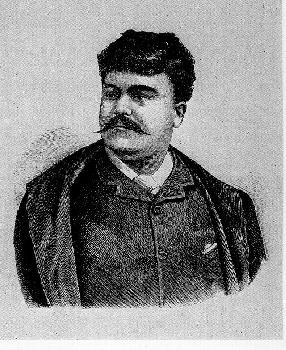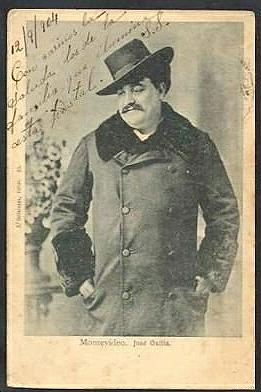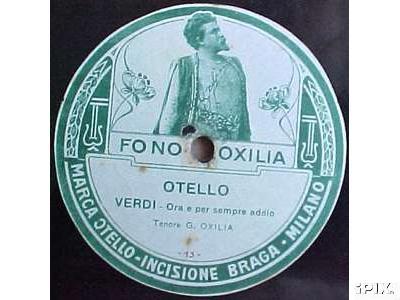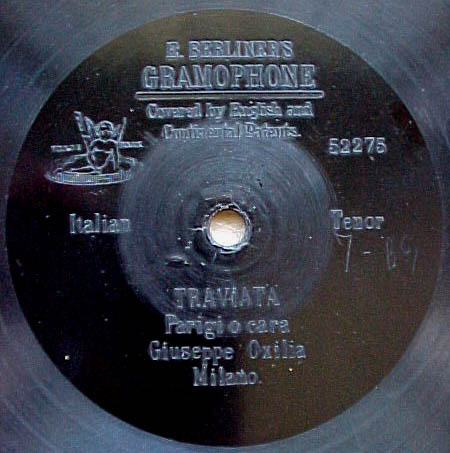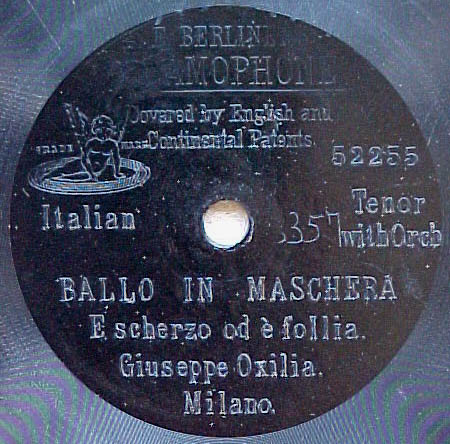Giuseppe Oxilia
Hamlet – Barcelona, Liceu, 21 November 1884 Lucia di Lammermoor (Arturo) – Barcelona, Liceu, 11 December 1884 La favorite – Barcelona, Liceu, 1 January 1885 Robert le diable (Rambaud) – Barcelona, Liceu, 10 February 1885 I Capuleti e i Montecchi (Tebaldo) – Barcelona, Liceu, 6 May 1885 Les huguenots (Cossé) – Barcelona, Liceu, 21 May 1885 Linda di Chamounix – Madrid, Real, November 1885 Robert le diable (Robert) – Madrid, Real, November 1885 La Gioconda – Madrid, Real, 11 March 1886 Rigoletto – Venezia, La Fenice, 3 August 1886 Mefistofele – Madrid, Real, 16 November 1886 Aida – Madrid, Real, winter 1886/87 Luisa Miller – Madrid, Real, 24 February 1887 Faust – London, Her's Majesty, 7 June 1887 Don Carlo – Padova, Verdi, June 1887 Otello – Brescia, Grande, 10 August 1887 Salammbo (composer: Nicolò Massa) – Torino, Carignano, 8? October 1887 La traviata – Napoli, San Carlo, 9 February 1888 Asrael (composer: Franchetti) – Bologna, Comunale, 17 March 1888 Lohengrin – Genova, Carlo Felice, 26 December 1899 Lucrezia Borgia – Montevideo, Solís, 21 June 1890 Lucia di Lammermoor (Edgardo) – Rosario, Olimpo, 17 July 1890 Les huguenots (Raoul) – Montevideo, Nuevo Politeama, 21 August 1890 Carmen – Montevideo, Nuevo Politeama, 30 August 1890 Cavalleria rusticana – Venezia, La Fenice, 31 January 1891 L'Africaine – Asti, Politeama, November 1894 Pagliacci – Monza, Sociale, October 1896 Poliuto – Bari, Piccinni, January 1898 Il trovatore – Milano, Carcano, December 1902 La forza del destino – Milano, Carcano, 2 February 1903
Pathé, Milano, 7 November 1899 456 Cavalleria rusticana (Mascagni): Mamma, quel vino AICC 456 Edison cylinders, Milano, 1901 802 Marina (Arrieta): Alma mía 12602 802B Marina (Arrieta): Alma mía 12602 802C Marina (Arrieta): Alma mía 12602 875 Marina (Arrieta): Costa la de Levante 12599 875B Marina (Arrieta): Costa la de Levante 12599 959 Marina (Arrieta): No es verdad 12604 959B Marina (Arrieta): No es verdad 12604 960 Marina (Arrieta): A beber, a beber 12605 960B Marina (Arrieta): A beber, a beber 12605 12720 Marina (Arrieta): No sabes tú que yo tenía 12720 Gramophone, Milano, July 1901 392G Lucia di Lammermoor (Donizetti): Fra poco a me ricovero 52321X 393G La Gioconda (Ponchielli): Cielo e mar 52324 395G Il Guarany (Gomes): Sento una forza indomita 52309 403G Aida (Verdi): Morir, sì pura e bella 52317 404G Lucia di Lammermoor (Donizetti): Fra poco a me ricovero 52321 3357G Un ballo in maschera (Verdi): È scherzo od è follia 52255 (7") 3369G Pagliacci (Leoncavallo): Un grande spettacolo 52246, 52248 (7") Gramophone, Milano, March 1902 1628G Otello (Verdi): Niun mi tema 52330, Zonophone X-92096 1629G Pagliacci (Leoncavallo): Vesti la giubba 52331 1630G Rigoletto (Verdi): La donna è mobile 52332, Zonophone X-92105 1631G Rigoletto (Verdi): Questa o quella 52333 1632G La favorite (Donizetti): Una vergine 52334, Zonophone X-92083 1633G L'Africaine (Meyerbeer): O paradiso 52361 1634G La traviata (Verdi): Dei miei bollenti spiriti 52360 1635G Andrea Chénier (Giordano): Un di all'azzurro spazio 52335 Gramophone, Milano, 11 April 1902 1771G Luisa Miller (Verdi): Quando le sere 52356 1773G La traviata (Verdi): Dei miei bollenti spiriti 52360 1774G Mefistofele (Boito): Dai campi 52357 1779G Lucia di Lammermoor (Donizetti): Fra poco a me ricovero 52358 4396G La traviata (Verdi): Libiamo, libiamo 52274 (7") 4397G La traviata (Verdi): Parigi, o cara 52275 (7") Gramophone, Milano, November 1902 2832R Luisa Miller (Verdi): Quando le sere 52356X 2833R Mefistofele (Boito): Giunto sul passo 52445 2834R La traviata (Verdi): Dei miei bollenti spiriti 52360X Pathé, Milano, 1902 or 1903 80209 Faust (Gounod): Interrogo invan 80209 L'Africaine (Meyerbeer): O paradiso This cylinder was on an auction list around 1991, was purchased by a collector who left it in Bermuda. A few years, later it was full of mildew according to the collector who could not locate it anymore. Gramophone, Milano, October 1903 35d Faust (Gounod): Interrogo invan 52283 Fono-Oxilia, Milano Otello (Verdi): Ora e per sempre addio 13 I wish to thank Richard J Venezia for the recording (Africaine). |
